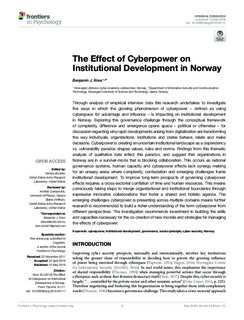| dc.contributor.author | Knox, Benjamin James | |
| dc.date.accessioned | 2019-09-03T07:21:49Z | |
| dc.date.available | 2019-09-03T07:21:49Z | |
| dc.date.created | 2018-10-31T11:34:22Z | |
| dc.date.issued | 2018 | |
| dc.identifier.citation | Frontiers in Psychology. 2018, 9 (MAY), . | nb_NO |
| dc.identifier.issn | 1664-1078 | |
| dc.identifier.uri | http://hdl.handle.net/11250/2612132 | |
| dc.description.abstract | Through analysis of empirical interview data this research undertakes to investigate the ways in which the growing phenomenon of cyberpower – defined as using cyberspace for advantage and influence – is impacting on institutional development in Norway. Exploring this governance challenge through the conceptual framework of complexity, difference and emergence opens space – political or otherwise – for discussion regarding why rapid developments arising from digitalization are transforming the way individuals, organizations, institutions and states behave, relate and make decisions. Cyberpower is creating an uncertain institutional landscape as a dependency vs. vulnerability paradox shapes values, rules and norms. Findings from this thematic analysis of qualitative data reflect this paradox, and suggest that organizations in Norway are in a survival-mode that is blocking collaboration. This occurs as national governance systems, human capacity and cyberpower effects lack synergy making for an uneasy arena where complexity, contestation and emerging challenges frame institutional development. To improve long-term prospects of governing cyberpower effects requires a cross-sectorial conflation of time and human resources. This means consciously taking steps to merge organizational and institutional boundaries through expressive innovative collaborations that foster a shared and holistic agenda. The emerging challenges cyberpower is presenting across multiple domains means further research is recommended to build a richer understanding of the term cyberpower from different perspectives. The investigation recommends investment in building the skills and capacities necessary for the co-creation of new models and strategies for managing the effects of cyberpower. | nb_NO |
| dc.language.iso | eng | nb_NO |
| dc.publisher | Frontiers Media | nb_NO |
| dc.rights | Navngivelse 4.0 Internasjonal | * |
| dc.rights.uri | http://creativecommons.org/licenses/by/4.0/deed.no | * |
| dc.title | The effect of cyberpower on institutional development in Norway | nb_NO |
| dc.type | Journal article | nb_NO |
| dc.type | Peer reviewed | nb_NO |
| dc.description.version | publishedVersion | nb_NO |
| dc.source.pagenumber | 13 | nb_NO |
| dc.source.volume | 9 | nb_NO |
| dc.source.journal | Frontiers in Psychology | nb_NO |
| dc.source.issue | MAY | nb_NO |
| dc.identifier.doi | 10.3389/fpsyg.2018.00717 | |
| dc.identifier.cristin | 1625367 | |
| dc.description.localcode | Copyright © 2018 Knox. This is an open-access article distributed under the terms of the Creative Commons Attribution License (CC BY). The use, distribution or reproduction in other forums is permitted, provided the original author(s) and the copyright owner are credited and that the original publication in this journal is cited, in accordance with accepted academic practice. No use, distribution or reproduction is permitted which does not comply with these terms. | nb_NO |
| cristin.unitcode | 194,63,30,0 | |
| cristin.unitname | Institutt for informasjonssikkerhet og kommunikasjonsteknologi | |
| cristin.ispublished | true | |
| cristin.fulltext | original | |
| cristin.qualitycode | 2 | |

